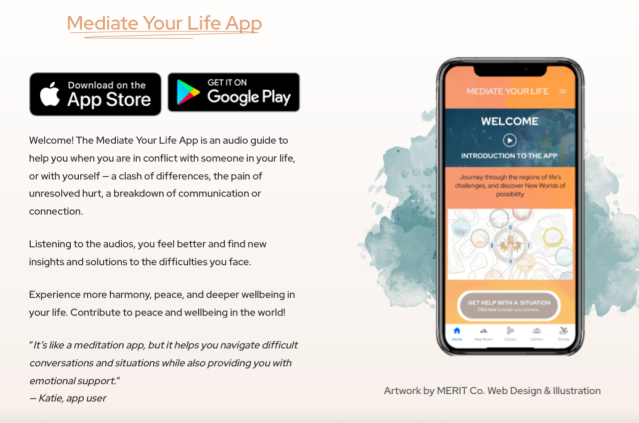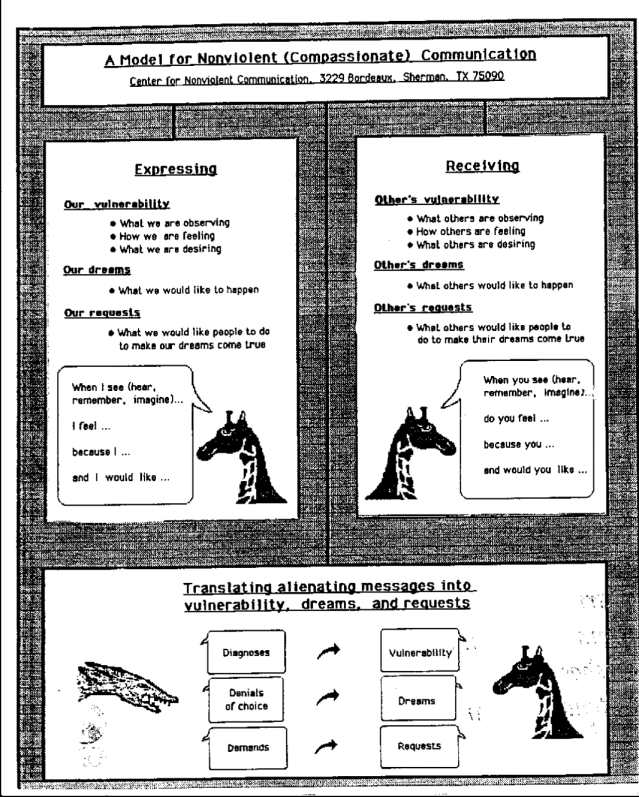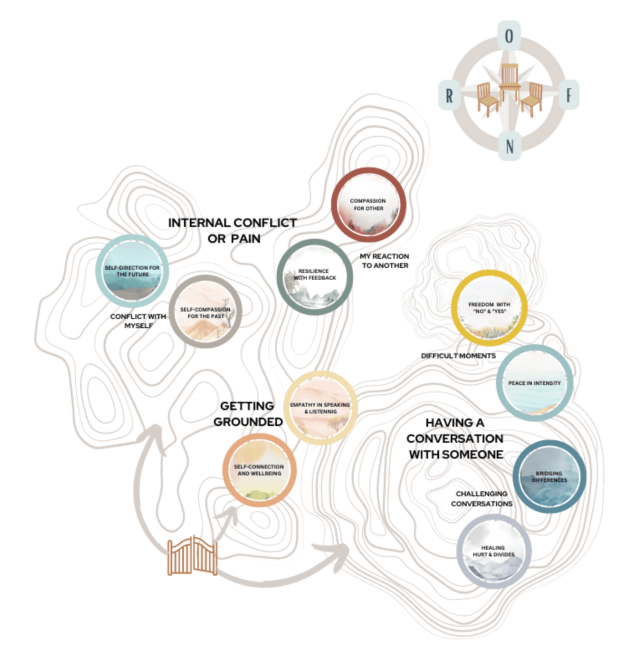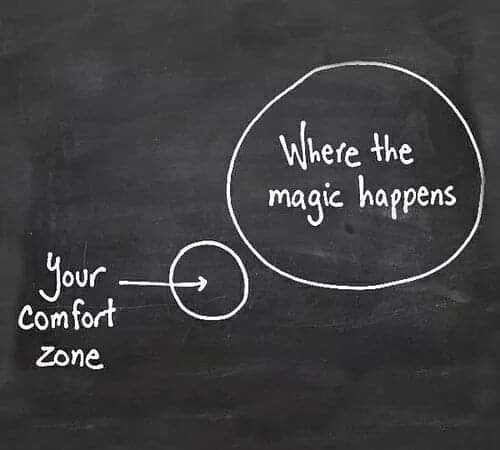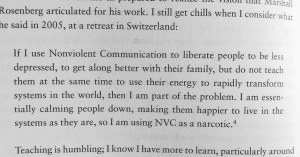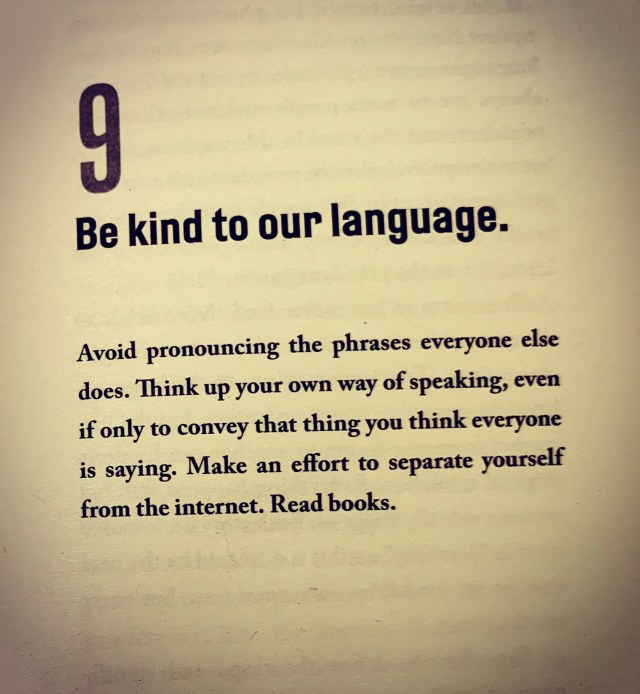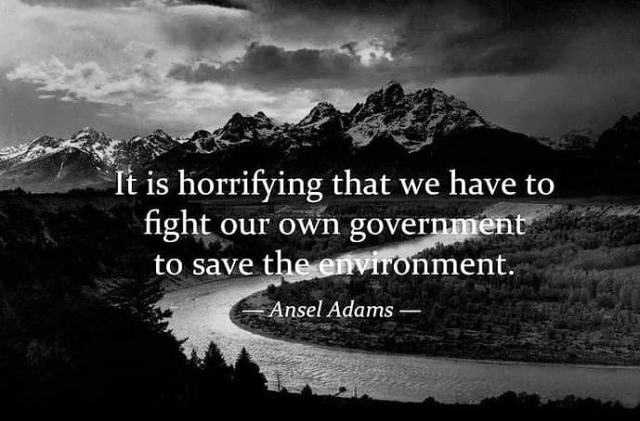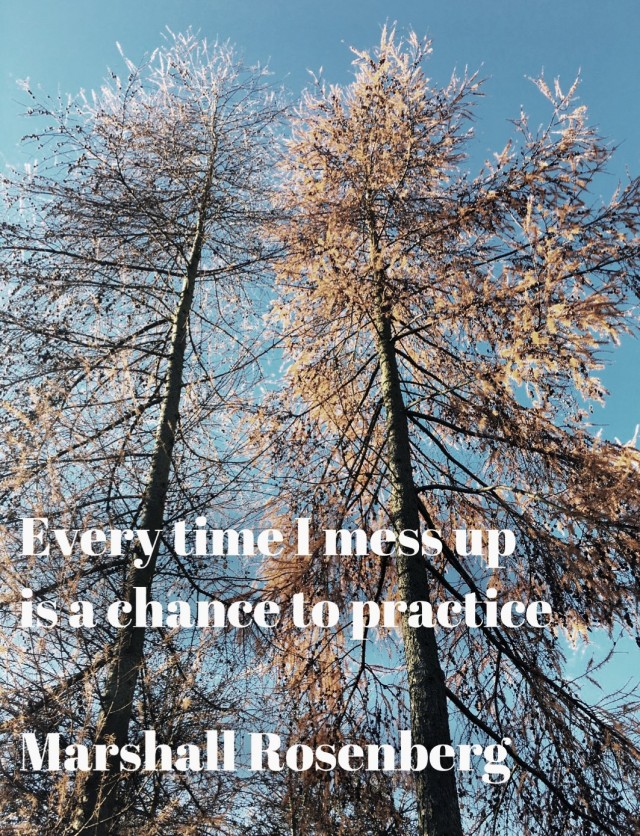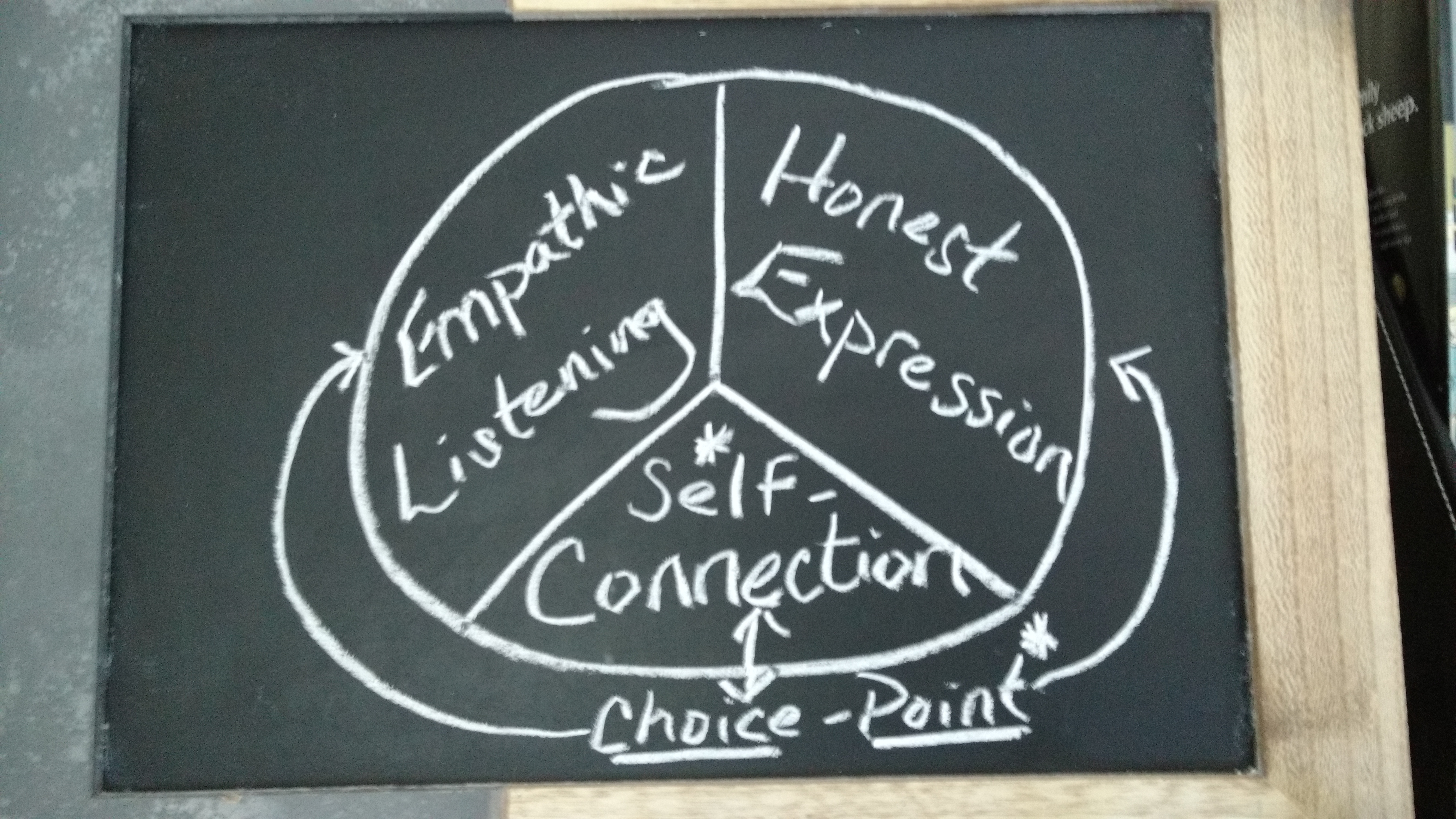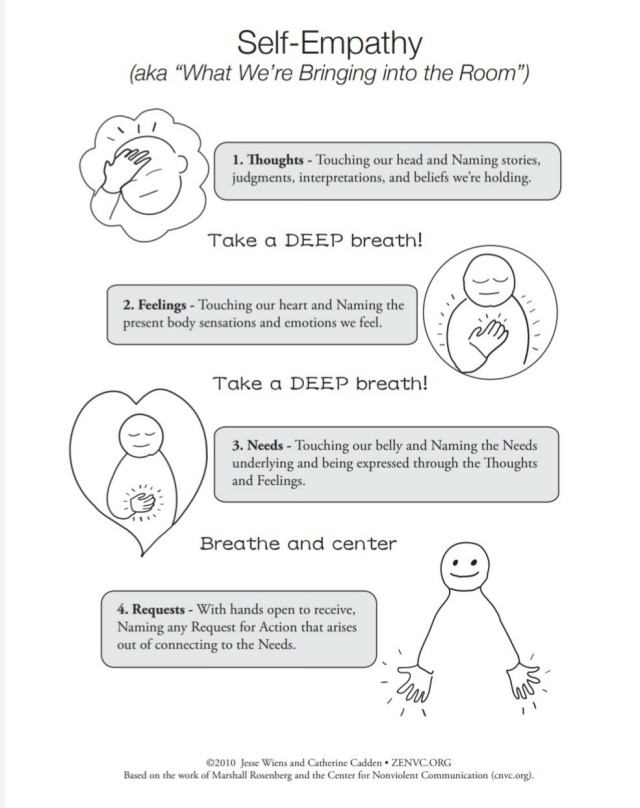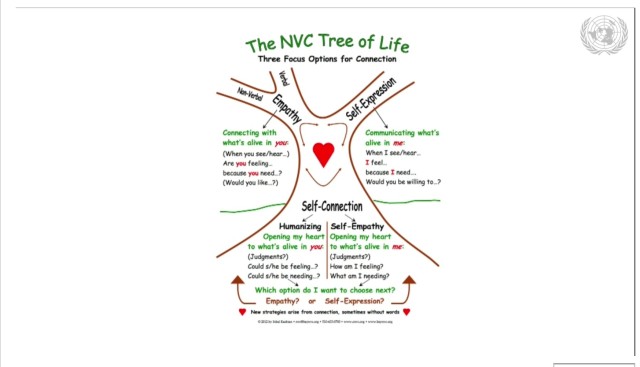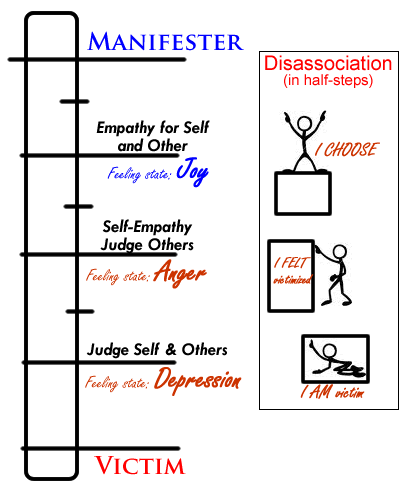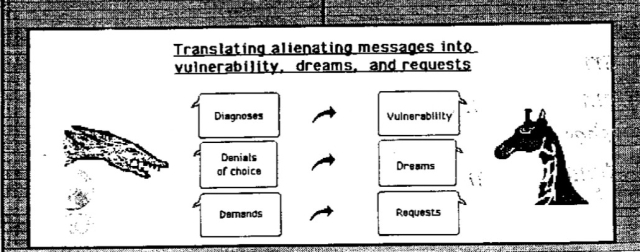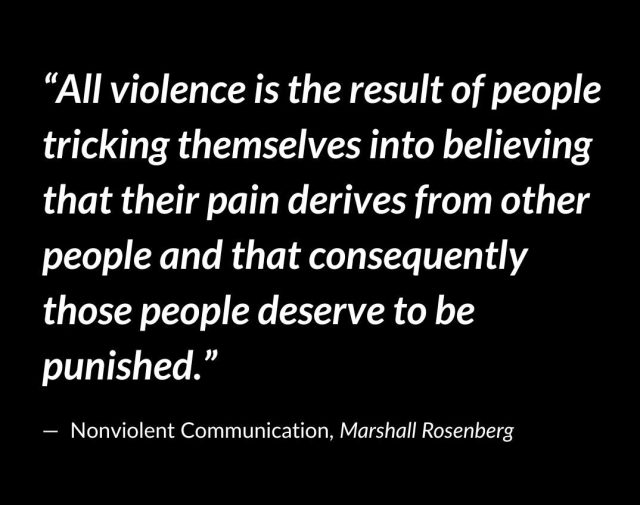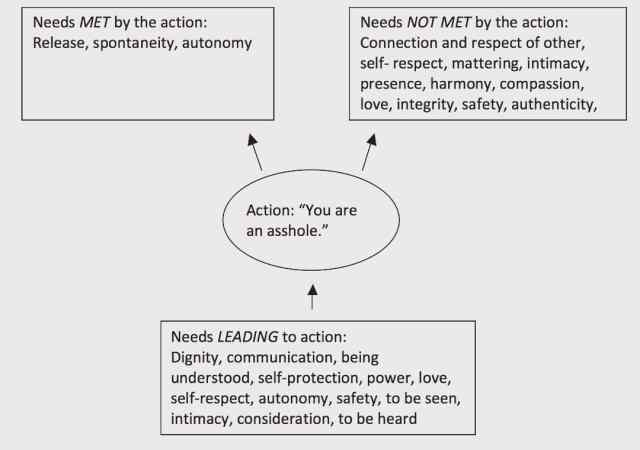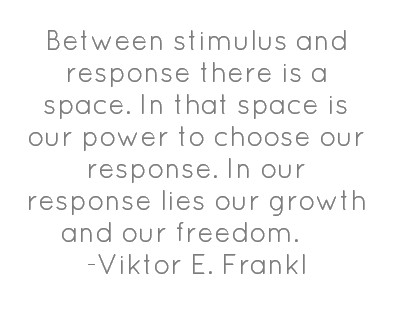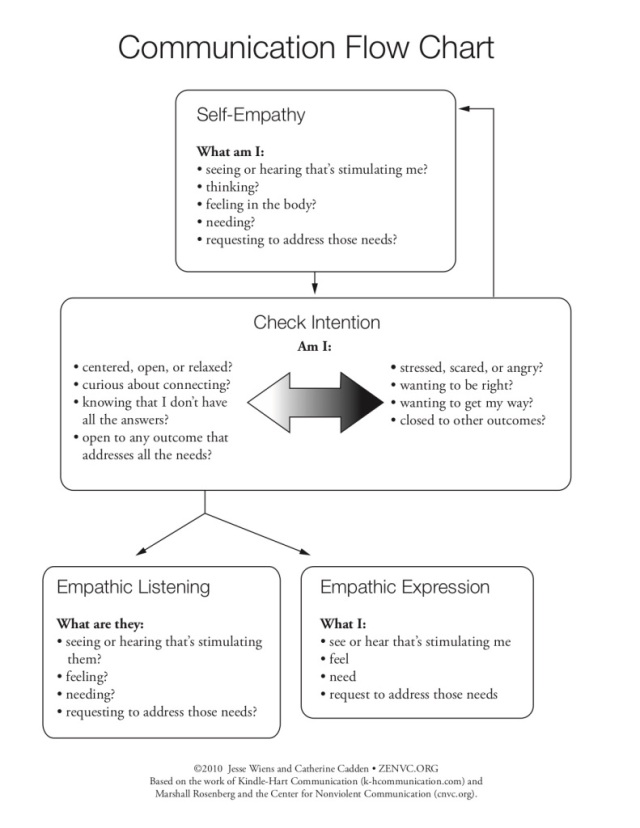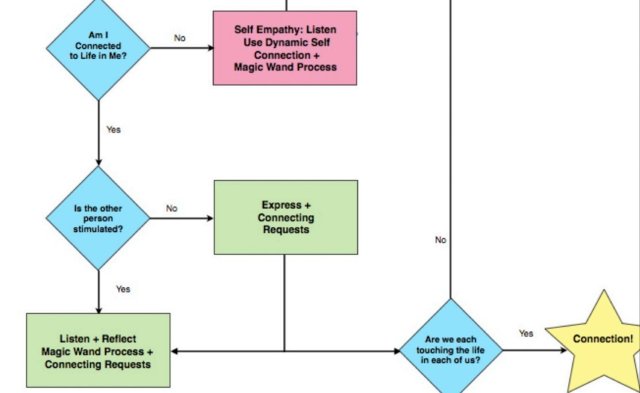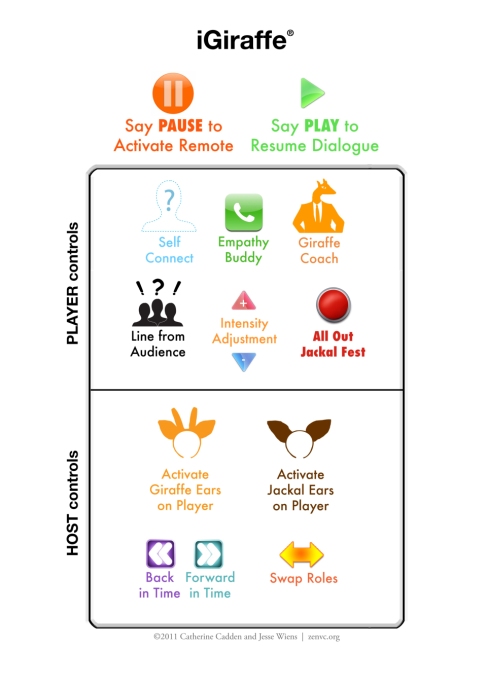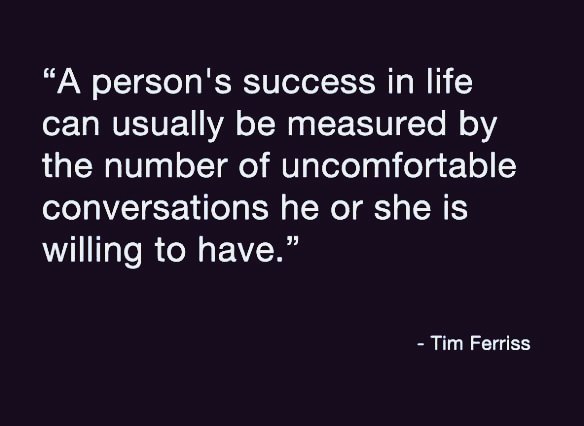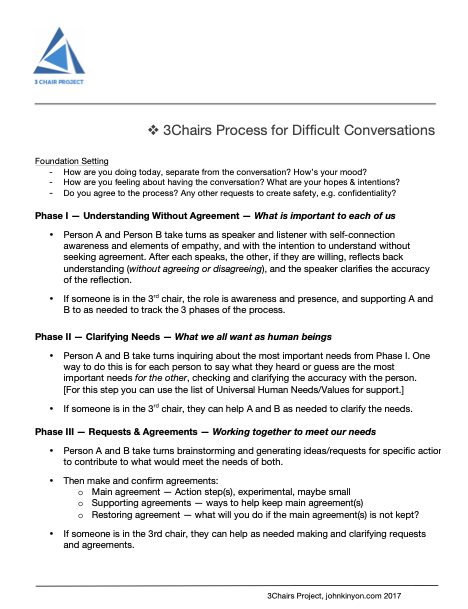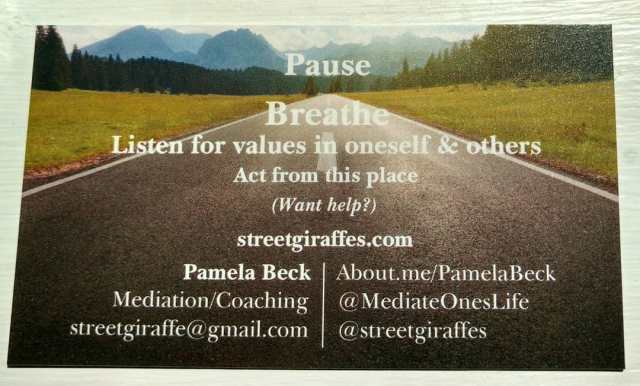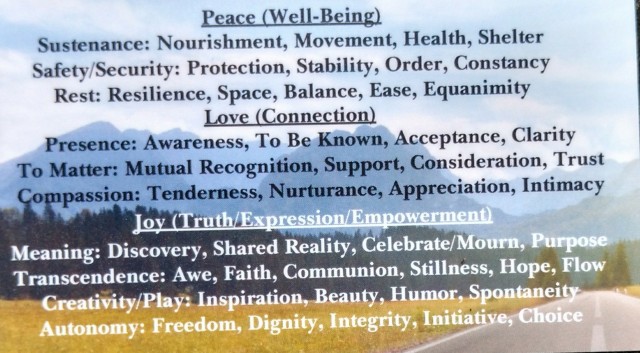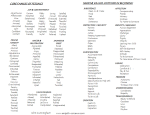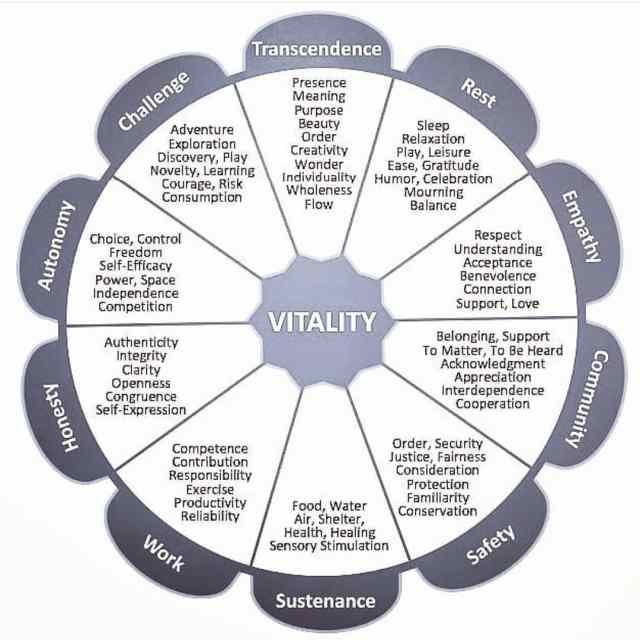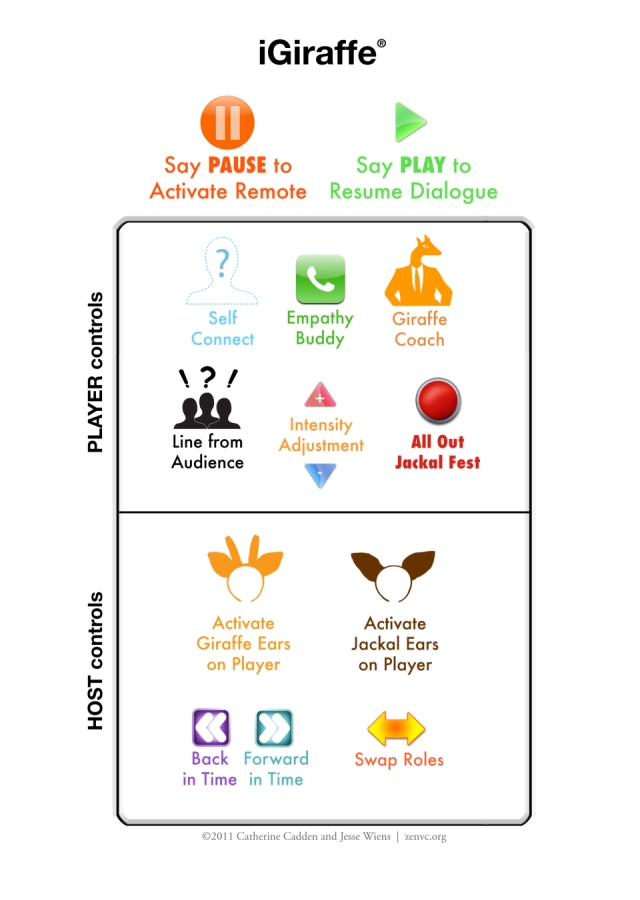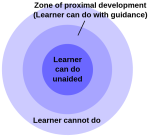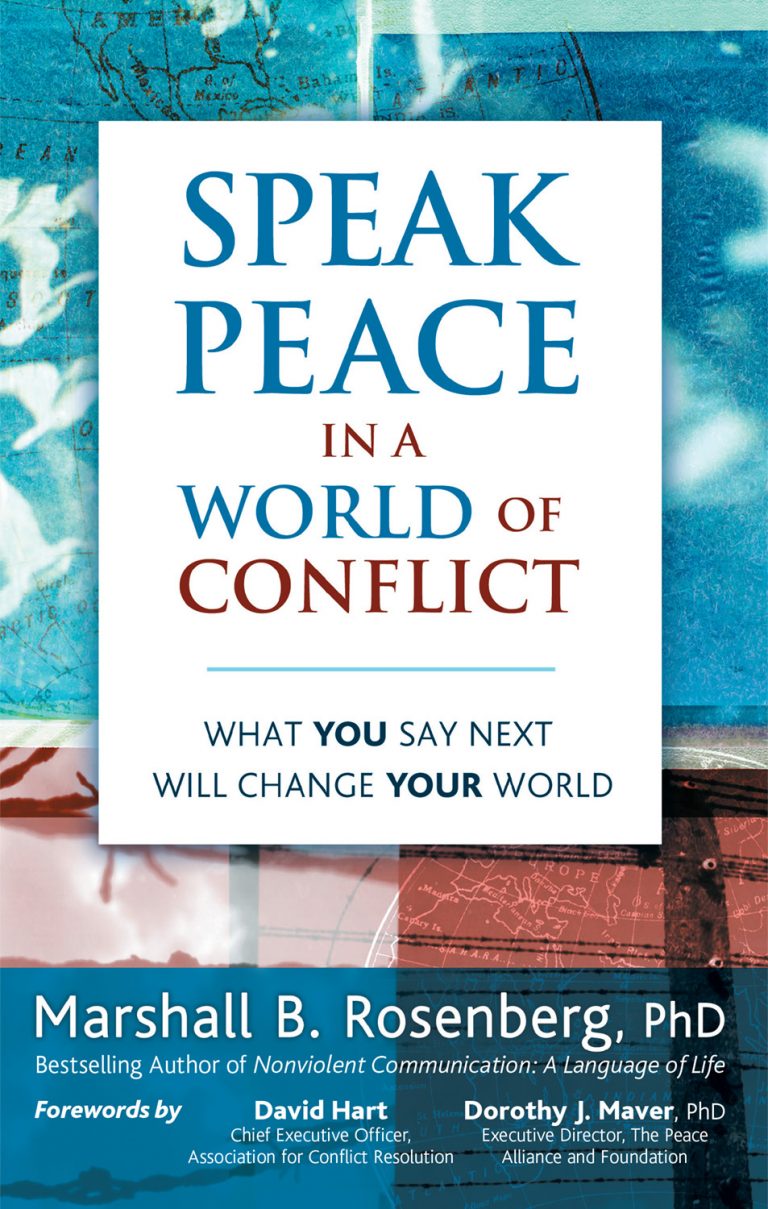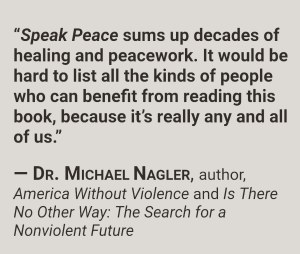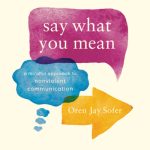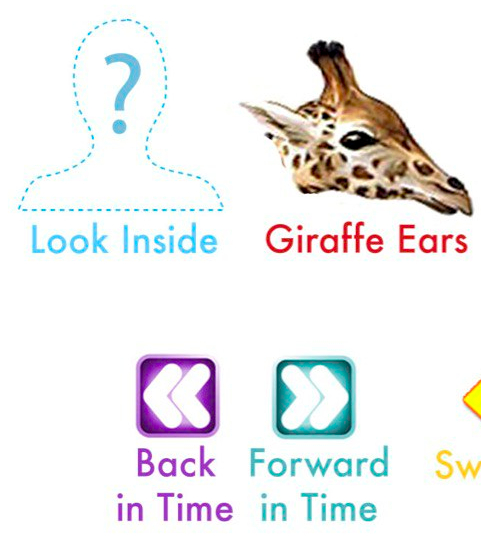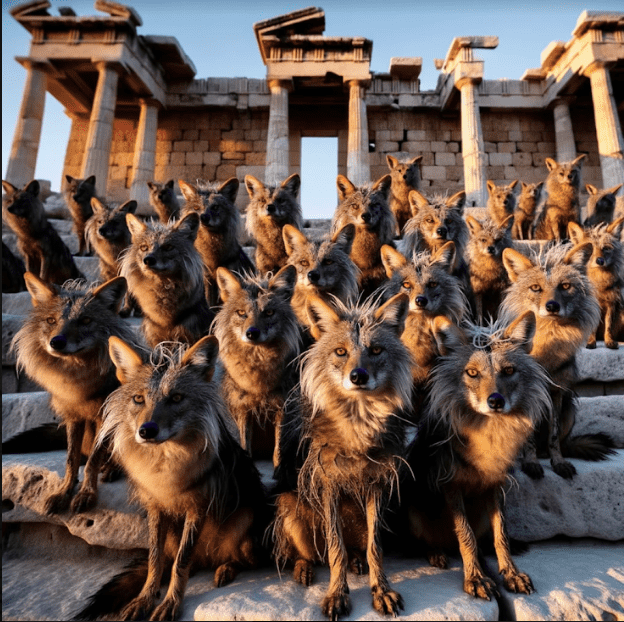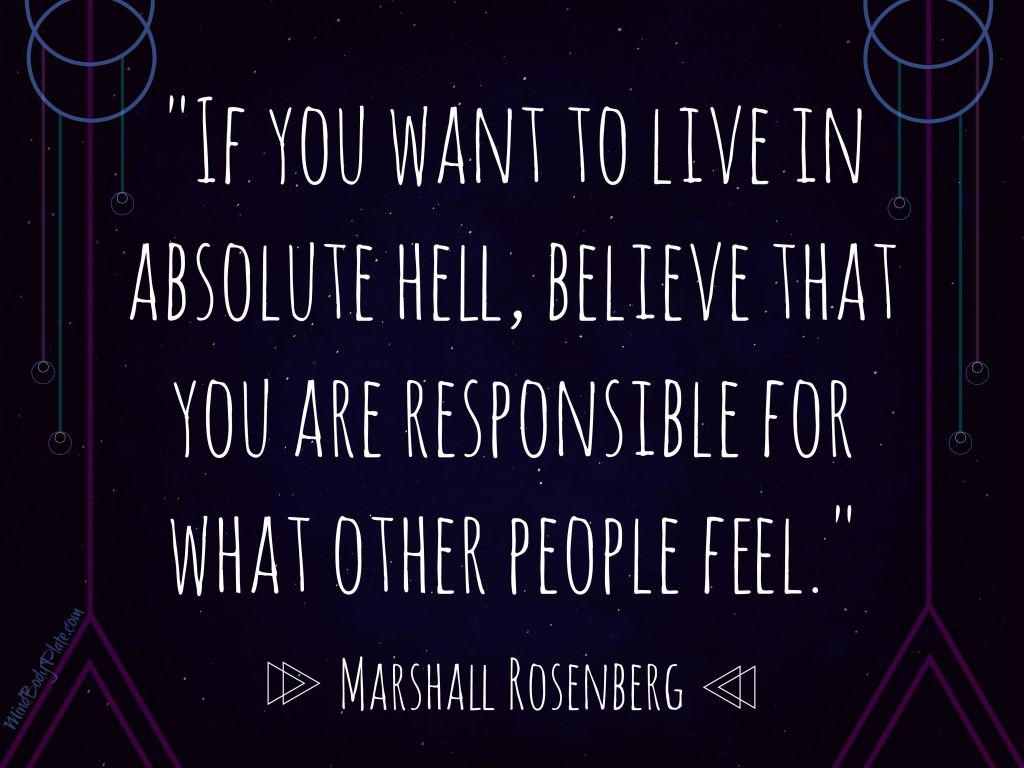What’s Up Next?
June 4, 2017 ~ Crazy Like a Fox

Ode to Joy, by Beethoven (1824) – Credit: Kokin
There is a vitality, a life force, an energy, a quickening that is translated through you into action, and because there is only one of you in all of time, this expression is unique. And if you block it, it will never exist through any other medium and it will be lost.
Martha Graham |
Inquiry:
Do you have a [universal human] needs guessing practice towards recognizing judgments (“jackals”) then fluently translating into a living-energy of needs?

Credit: Barry Goyette
Turn your Judgments into gold
Tool for the call:
Kate Raffin’s
Giraffe and Jackal Journal
While watching a family of foxes recently, I noticed the similarity to jackals in the wild, and thought to offer a couple of practices you can do at home (alone). If guessing needs, off a needs lists (whether mental or actual), could be viewed as ‘doing the math’ — let’s say algebra — then the first exercise will be a simplified version (arithmetic) while the second will be more complex (calculus).
So, to begin, much of the time our ‘jackals’ (or the judgmental thoughts that arise unbidden) murmur beneath our conscious detection. Sort of like a critter curled up, sleeping, beneath a tree. However, its eyes pop open when a stimulus arises (whether within or without). At this point our minds are offering a kind of narration, akin to the Greek chorus in an ancient dramatic play, and it has begun to intrude upon our conscience awareness (or the action of our live’s unfolding play).
As the head arises, it’s an indication of a thought/feeling tripwire that is seeking to be attended to. This is the beginning of the NVC process, distinguishing the observation/stimulus from our evaluation/interpretation. It’s also sometimes the beginning as well as the end, when we conflate observation and interpretation (or in cognitive schools, the activating event and our belief: ). So the first step is to notice the stirring of the jackal, as it raises its head, it offers an opportunity for exploration (towards something valued, crazy like a fox).
In NVC mediation, tracking needs is the name of the game, and one of the pioneers in this field — John Kinyon — has developed a list based on three meta categories of needs: well-being (peace), connection (love), meaning (joy). All the rest of the needs could fit within these three broader subgroups. This can come in handy, when an especially conflicted mediation drains our energetic reserves. Instead of the extra computational processing required in deterring a specific need, John has offered a practice of categorizing according to these three larger frameworks. Is this the realm of well-being (peace), connection (love), or meaning (joy)? And by orienting oneself to this in our quiet/down-time, it may arise more automatically when confronted by a heated situation.

Credit: Zerovina
Peace | Love | Joy
| Peace (Well-Being) |
Love (Connection) |
Joy (Meaning) |
| Sustenance/Health | Love/Caring | Autonomy/Authenticity |
| Safety/Security | Empathy/Understanding | Creativity/Play |
| Peace/Beauty/Rest | Community/Belonging | Meaning/Contribution |
| [PDF] John Kinyon’s Needs List |
| Mediate Your Life Handouts – Self-Connection Process (SCP) |

A mnemonic memory device I’ve used to recall the the three needs beneath is Elvis Costello’s song:
(What’s So Funny ‘Bout) Peace, Love & Understanding
By practicing this simpler, more arithmetic-like form of needs guessing, we’re becoming accustomed to seeing the jackal (or fox) as a guardian of something we value (one of the universal human needs) and hopefully becoming more adept at discerning between an observation and our thoughts.
See too: ABCDE Model REBT – Animated
Dian Killian podcast: Making Clear Observations (using PLATO)
Jackals, on guard, are a signal towards…
Transforming the Pain of Unmet Needs to the Beauty of Needs
A second, more challenging offshoot of this peace/love/joy needs-guessing practice comes when listening to a ‘hard-to-hear’ message, such as something you disagree with in politics or culture. Ike Lasater, another pioneer of NVC mediation, has said that he’ll listen to NPR or some other news program, especially mindful of attuning to views with which he disagrees, and utilizes this as an opportunity for ‘stealth’ (or silent) needs-guessing practice. Listening, while discerning which of the three broad brushstrokes (of needs) are being valued, can come in handy when the rubber meets the road in real life.
A second, more complex needs guessing practice is converting a (single word) need to a full-fledged phrase. If you think of strategies and needs being on two opposite ends of a spectrum, the needs phrase is positioning our guess somewhere in the middle, between that which is overly generalized (as one word can be, such as the need for love or meaning), while avoiding the specificity of a strategy (something that is attached to a person, location, action, time, or object that may be disagreeable to our interlocutor). A phrase can be more connecting, as it’s more relatable, but may avoid the trap of something too concrete for common ground.
So when we think back to our jackal stirring, notice that the interpretive framework of a jackal likely includes some reference to the past or concern as to the future, a kind of probability vector that it wants to avoid.
As you become skilled at translating a jackal thought to one of the three needs, it will become second nature that jackals have a method to their madness (which may not be obvious, initially). That there is a concern, a sense of lack (an unmet need) that is calling out for attention. That the internal process of transforming a sense of mourning to an appreciation for the beauty of the need in play.

Phase One – Intrapersonal
Crazy Like a Fox
Identifying Jackal(s) – The Probability Vector
Jackal’s role: identifying what’s not working.
The jackal raises up from its more slumbering perch when it becomes agitated by what’s not working (detecting a kind of ‘bad faith’ — whether now or in the past) and projects this trajectory, and its potential impact, into the future. It’s role is as an advocate for greater authenticity (self-honesty, authenticity with others) and a harbinger as to its view of the ‘probability vector’ that we are currently on. By howling in its “should”/”shouldn’t” dialectic, it’s alerting to likely pitfalls.
Watching the Jackal Show
Mourning & Beauty of Needs — Keep channel open…
(Courtesy of the work of Robert Gonzales)
Mourning
| Steps | Write |
| 1. Stimulus (observation)
(write out) |
Stimulus: |
| 2. Jackal Thoughts
a. Write the thought 3. Review the original stimulus |
Jackal thoughts: |
| 4. Self-empathize a. Consider stimulus b. Name and be with the unmet needs of the stimulus c. Name and be with the the feelings around the unmet need d. Stay here until you feel a shift towards relaxed, relief.This is the mourning stage. |
Unmet needs:
Feelings around unmet needs: |
Beauty/Living-Energy
| Steps | Write: |
| 5. Experience the beauty of the need.
Describe your experience of the beauty of the unmet need: if troubled, remember a time when the need was met, how wonderful that felt. |
Beauty of the Need: |
| 6. Bring beauty of needs awareness to original stimulus.
Notice and write down if any feelings or needs come alive. (If applicable, make any request related to those feelings and needs.) |
Needs:
Feelings: Requests: |
| Re-cycle through process, if/when necessary (cyclical rather than linear as new jackals get stimulated throughout) |
Needs exclude all tangibles, i.e. PLATO – Person, Location, Action, Time or Object
Ode to Joy
Phase Two – Interpersonal
Once connected with that which is longed for, whether in our own lives or another’s, we can fine tune our description by moving from a single word towards crafting a phrase (the calculus practice).
Speak clearly, if you speak at all; carve every word before you let it fall.
~ Oliver Wendell Holmes
Phrasing Needs
(Between 13 – 23:30 minute mark)
Via the work of Miki Kashtan: “To focus on another challenging line to walk in learning to have fluidity in our communication. It’s the line that separates strategies from needs while still maintaining relevant contextual specificity in the choice of words for needs. (Have a copy of the needs list available as you do this activity so as to enjoy variety.) Collect a variety of situations in which you are very clear what the preferred strategy is for you or for someone else. For each of them, do the following steps: 1) Write down the strategy minus any evaluation or demand, just exactly what you or the other person wants; 2) Find the need that seems the most relevant to you for this strategy. If this is your preferred strategy, you can usually fully identify the need. If it’s another person’s preferred strategy, just write down your best guess. This will almost always be just one word from the needs list: autonomy, respect, competence, love, meaning, etc. 3) Find a full phrase consisting of a few words that is specific enough to fit the context and yet is still clearly a need and not a strategy. For example, the needs-phrase of ‘harmony with family members’ vs. the need (word) of ‘harmony’ – and not (the strategy) “to get along with my family.”
[See also: PLATO]
Full-Phrase-Need
Steps:
1) Scenario; 2) Preferred Strategy; 3) [Universal] Need; 4) Phrase
[UNIVERSAL] NEED-to-PHRASE
E.g.
Need (word) – Effectiveness
Need Phrase – Effectiveness of a crisp message
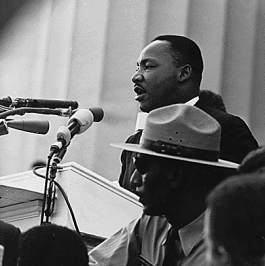
Dr. Martin Luther King, Jr. speaking at the Civil Rights March on Washington, Aug. 28, 1963.
(Credit: Army images)
Alternate Need Phrase – Effectiveness of large numbers

Martin Luther King Jr. addresses a crowd from the steps of the Lincoln Memorial where he delivered his famous, “I Have a Dream,” speech during the Aug. 28, 1963, march on Washington, D.C. (Credit: Marines via Wiki)
See an additional example here: Phrasing Needs
Example (to experiment with yourself):
1) Scenario: Marshall Rosenberg developed a communication process in the 1960s.[3]
2) Preferred Strategy: Rosenberg opted to call it “Nonviolent Communication”
3) [Universal Human] Need: __________ – Needs List
4) Phrase: ________________________________________
Inquiry: What Need [#3] and/or Full-Need Phrase [#4] best captures why Marshall Rosenberg might have chosen the name “Nonviolent Communication” [#2] to refer to the dialogue process he developed in the 1960s which paralleled the civil rights & nonviolent resistance movements of that era [#1]?
Via the CNVC.org website:
Nonviolent Communication (NVC) is based on the principles of nonviolence — the natural state of compassion when no violence is present in the heart. NVC begins by assuming that we are all compassionate by nature and that violent strategies—whether verbal or physical—are learned behaviors taught and supported by the prevailing culture. NVC also assumes that we all share the same, basic human needs, and that each of our actions are a strategy to meet one or more of these needs. People who practice NVC have found greater authenticity in their communication, increased understanding, deepening connection and conflict resolution.
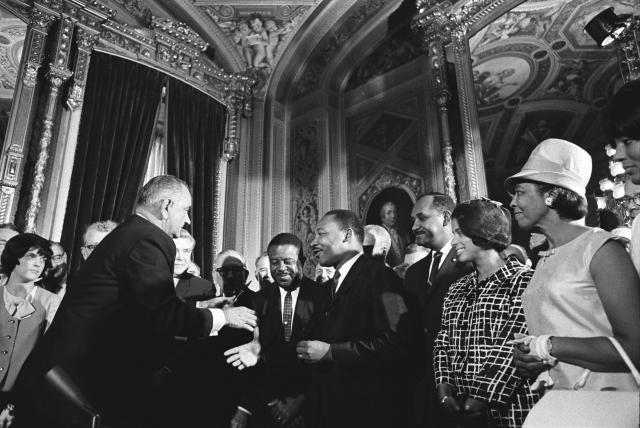
President Lyndon B. Johnson meets with Martin Luther King, Jr. at the signing of the Voting Rights Act of 1965 (Credit: Yoichi Okamoto via Wikimedia Commons)
Courtesy of ~ Need vs. Strategy or request – NVCWiki
Need vs. Strategy or request
| Need | Strategy / Request |
| Abstract, no reference to a specific person, action or time | Specific, doable, observable behaviour |
| Needs are a-scriptive, it is difficult to put words on what is also described as “the universal energy that connects all of us”. Need language is probably the closest we can get to verbally describe this universal energy. | Descriptive |
| What I want to have fulfilled | What I want others or myself to do |
Phrase to exclude all tangibles, i.e. PLATO – Person, Location, Action, Time or Object
 Portrait of Martha Graham by Nickolas Muray
Portrait of Martha Graham by Nickolas Muray
|
I believe that we learn by practice. Whether it means to learn to dance by practicing dancing or to learn to live by practicing living, the principles are the same. in each it is the performance of a dedicated set of acts, physical or intellectual, from which comes the shape of achievement, a sense of one’s being, a satisfaction of spirit. One becomes in some areas an athlete of God. ~ Martha Graham
|

Utilizing “Universal-Need-Full-Phrase” in Role Plays:
1. Engage in more role plays — here’s the basic outline:
a. In a particular scenario, think of your preferred strategy, and translate it into a full-phrase need.
i. Find the underlying need that is expressed through this strategy.
ii. Fit this need into a full-phrase need that is specific to the context and the truth of the moment without including specific people, location, action, time, or object [PLATO].
iii. If you find that elements of strategy are still present, look for a deeper need that is informing the need you previously identified. For example, sometimes clarity can be a strategy for safety. Once you find a deeper need, it will usually be easier to find a strategy free contextualized full-phrase need.b. Communicate as fluidly as possible to your dialogic/role-play partner as that other person. Remember to include a request.
c. Have your dialogic/role-play partner respond as the other person, without use of NVC.
d. Apply the same process to what the other person says to respond empathically:
i. Find a full-phrase need underlying whatever they said, be it strategy, judgment, demand, or anything else.
ii. Put that need in an empathic guess without the words feeling or need.e. Continue in this slow-motion kind of dialogue, choosing empathy or expression in each round.
2. Offer each other empathy for whatever you want that kind of attention, and every few moments pause the process and find the full-phrase need that would fit the context. Once you reach fluency, the goal is to focus on full-phrase need language most of the time.

With the Paris Accords recently in the news, below are three examples — of varying jackal intensity — of both the peace/love/joy practice and the full-phrase one.
Stimulus/Observation:
Climate change could make cities 8C hotter – scientists
Under a dual onslaught of global warming and localised urban heating, some of the world’s cities may be as much as 8C (14.4F) warmer by 2100, researchers have warned.
Bill McKibben Does the Math
“That’s worse odds than Russian roulette.” ~ Bill McKibben
Need: Love (Connection)
&/or
Need Phrase – Effectiveness of a crisp message
(i.e. “talk pragmatically”)
Roger Cohen: Americans, Let’s Talk
Conclusion: …As Abe Streep, a journalist and writer based in Montana, put it to me: “Nobody’s ever been convinced by being made to feel stupid.”
I spoke to Alexandra Arboleda, a lawyer in Phoenix, who was elected last year to the board of the Central Arizona Water Conservation District. She’s a Democrat in a Republican county and a woman who feels strongly about climate change in an area where such convictions encounter hostility.
“You have to be more receptive and see where people who don’t think like you come from,” she said. “Most people are concerned about climate change. But where in Telluride that might be priority number one, with Republicans it’s down the list. So you have to adjust. Instead of talking about sustainability and climate change — words that set them off — talk pragmatically about drought conservation plans. Persuade them that increasing irrigation efficiency at a time of the longest drought in recorded history on the Colorado River System benefits everyone from farms to downstream city users. It’s doable. But you have to curb the liberal arrogance that’s out there.”
America needs the conversations it’s not having. They start, for both sides, with listening. The alternative is bloody confrontation.
Need: Joy (Meaning)
&/or
Need Phrase – Effectiveness of large numbers
(i.e. an educated, scientifically-literate electorate)
Neil deGrasse Tyson, Astrophysicist, Director of the Hayden Planetarium at the American Museum of Natural History:
“If we have dysfunctional politicians, it’s because we have a dysfunctional electorate,” Tyson pointed out.
Neil DeGrasse Tyson – What I would do if I were President?
Neil deGrasse Tyson when questioned by the New York Times as to…
If I Were President…
New York Times
August 21, 2011
Part of collection of opinions on the topic: If I Were President…
which appeared in the Sunday Review section. What follows is the unedited version of what was published.
The question, “If I were President I’d…” implies that if you swap out one leader, put in another, then all will be well with America—as though our leaders are the cause of all ailments.
That must be why we’ve created a tradition of rampant attacks on our politicians. Are they too conservative for you? Too liberal? Too religious? Too atheist? Too gay? Too anti-gay? Too rich? Too dumb? Too smart? Too ethnic? Too philanderous? Curious behavior, given that we elect 88% of Congress every two years.
A second tradition-in-progress is the expectation that everyone else in our culturally pluralistic land should hold exactly your own outlook, on all issues.
When you’re scientifically literate, the world looks different to you. It’s a particular way of questioning what you see and hear. When empowered by this state of mind, objective realities matter. These are the truths of the world that exist outside of whatever your belief system tells you.
One objective reality is that our government doesn’t work, not because we have dysfunctional politicians, but because we have dysfunctional voters. As a scientist and educator, my goal, then, is not to become President and lead a dysfunctional electorate, but to enlighten the electorate so they might choose the right leaders in the first place.
Need: Peace (Well-Being)
&/or
Need Phrase – Awareness of the Shadow
(i.e. Krugman, “So am I suggesting that the world’s most powerful leader might put the whole planet’s future at risk so that he can keep telling politically convenient lies, which will soon be exposed in any case? Yes.” &/or Chomsky, “And that means extermination of the species is very much an—very much an open question. I don’t want to say it’s solely the impact of the Republican Party—obviously, that’s false—but they certainly are in the lead in openly advocating and working for destruction of the human species.”)
Krugman: Trump’s Energy, Low and Dirty
Excerpted: …Which brings me back to Trump’s European trip, which was remarkable not for what Trump did but for what he didn’t do.
First, in Brussels, he declined to endorse NATO’s Article 5, which says that an attack on any NATO member is an attack on all. In effect, he repudiated the central plank of America’s most important alliance. Why, it was almost as if he’s more interested in appeasing Vladimir Putin than he is in defending democracy.
Then, in Taormina, he was the only leader who refused to endorse the Paris climate accord, a global agreement to limit greenhouse gas emissions that may be our last good chance to avoid catastrophic climate change. Why?
At this point, claims that trying to limit emissions would cause vast economic harm have lost all credibility: The same technological progress in alternative energy that is marginalizing coal would make the transition to a low-emissions economy far cheaper than anyone imagined a few years ago…
Conclusion:
…But Trump isn’t offering coal country real help, just a fantasy about turning back the clock. This fantasy won’t last for long: In a couple of years it will be obvious, whatever he does, that the coal jobs aren’t coming back. But the fantasy won’t even last that long if he goes along with the Paris accord.
So am I suggesting that the world’s most powerful leader might put the whole planet’s future at risk so that he can keep telling politically convenient lies, which will soon be exposed in any case? Yes. If you find this implausible, you must not have been reading the news the past few months.
Now, maybe Trump won’t really pull the plug on Paris; or maybe he’ll be gone from the scene before the damage is irreversible. But there’s a real possibility that last week was a pivotal moment in human history, the moment when an irresponsible leader sent the whole world careening off to hell in a golf cart.
Excerpted from Democracy Now! (transcript)
AMY GOODMAN: I wanted to ask you about this comment that you made that the Republican Party, you said, is the most dangerous organization in world history. Can you explain?
NOAM CHOMSKY: I also said that it’s an extremely outrageous statement. But the question is whether it’s true. I mean, has there ever been an organization in human history that is dedicated, with such commitment, to the destruction of organized human life on Earth? Not that I’m aware of. Is the Republican organization—I hesitate to call it a party—committed to that? Overwhelmingly. There isn’t even any question about it.
Take a look at the last primary campaign—plenty of publicity, very little comment on the most significant fact. Every single candidate either denied that what is happening is happening—namely, serious move towards environmental catastrophe—or there were a couple of moderates, so-called—Jeb Bush, who said, “Maybe it’s happening. We really don’t know. But it doesn’t matter, because fracking is working fine, so we can get more fossil fuels.” Then there was the guy who was called the adult in the room, John Kasich, the one person who said, “Yes, it’s true. Global warming’s going on. But it doesn’t matter.” He’s the governor of Ohio. “In Ohio, we’re going to go on using coal for energy, and we’re not going to apologize for it.” So that’s 100 percent commitment to racing towards disaster.
Then take a look at what’s happened since. The—November 8th was the election. There was, as most of you know, I’m sure, a very important conference underway in Morocco, Marrakech, Morocco. Almost roughly 200 countries at the United Nations-sponsored conference, which was—the goal of which was to put some specific commitments into the verbal agreements that were reached at Paris in December 2015, the preceding international conference on global warming. The Paris conference did intend to reach a verifiable treaty, but they couldn’t, because of the most dangerous organization in human history. The Republican Congress would not accept any commitments, so therefore the world was left with verbal promises, but no commitments. Well, last November 8th, they were going to try to carry that forward. On November 8th, in fact, there was a report by the World Meteorological Organization, a very dire analysis of the state of the environment and the likely prospects, also pointed out that we’re coming perilously close to the tipping point, where—which was the goal of the—the goal of the Paris negotiations was to keep things below that—coming very close to it, and other ominous predictions. At that point, the conference pretty much stopped, because the news came in about the election.
And it turns out that the most powerful country in human history, the richest, most powerful, most influential, the leader of the free world, has just decided not only not to support the efforts, but actively to undermine them. So there’s the whole world on one side, literally, at least trying to do something or other, not enough maybe, although some places are going pretty far, like Denmark, couple of others; and on the other side, in splendid isolation, is the country led by the most dangerous organization in human history, which is saying, “We’re not part of this. In fact, we’re going to try to undermine it.” We’re going to maximize the use of fossil fuels—could carry us past the tipping point. We’re not going to provide funding for—as committed in Paris, to developing countries that are trying to do something about the climate problems. We’re going to dismantle regulations that retard the impact, the devastating impact, of production of carbon dioxide and, in fact, other dangerous gases—methane, others.
OK. So the conference kind of pretty much came to a halt. The question—it continued, but the question was: Can we salvage something from this wreckage? And pretty amazingly, the countries of the world were looking for salvation to a different country: China. Here we have a world looking for salvation to China, of all places, when the United States is the wrecking machine that’s threatening destruction, in—with all three branches of government in the hands of the most dangerous organization in human history.
And I don’t have to go through what’s happened since, but the—in general, the Cabinet appointments are designed to—assigned to people whose commitment and beliefs are that it’s necessary to destroy everything in their department that could be of any use to human beings and wouldn’t just increase profits and power. And they’re doing it very systematically, one after another. EPA, Environmental Protection Agency, has been very sharply cut. Actually, the main department that’s concerned with environmental issues is the Department of Energy, which also had very sharp cuts, particularly in the environment-related programs. In fact, there’s even a ban on posting and publishing information and material about this.
And this is not just at the national level. The Republican Party, whatever you want to call it, has been doing this at every level. So, in North Carolina, a couple of years ago, where the Legislature, mostly thanks to gerrymandering, is in the hands of the Republicans, there was a study. They called for a study on the effect of sea level rise—on what sea level rise might be on the North Carolina coast. And there was a serious scientific study, which predicted, in not—I forget how many years—not a long time, about roughly a meter rise in sea level, which could be devastating to eastern North Carolina. And the Legislature did react, namely, by passing legislation to ban any actions or even discussion that might have to do with climate change. Actually, the best comment of this—I wish I could quote it verbatim—was by Stephen Colbert, who said, “If you have a serious problem, the way to deal with it is to legislate that it doesn’t exist. Problem solved.” You know, this is going on all over the country.
Shall we play a game?
Chomsky (continues): And it’s not just—it’s not simply climate change. That’s bad enough. But there’s another huge specter that we’re kind of trying to survive under, and that’s nuclear war. That’s a whole other story. Here, both the Obama administration and, increasingly, Trump are radically increasing that danger. This—the threat of the new developments is captured very effectively in the best, simple monitor of the state of the world, established at the beginning of the nuclear age by the Bulletin of Atomic Scientists. I’m sure you all know about this, but the Bulletin of Atomic Scientists regularly brings together a group of scientists, political analysts, other very serious people, to try to give some kind of estimate of what the situation of the world is. The question is: How close are we to termination of the species? And they have a clock, the Doomsday Clock. When it hits midnight, we’re finished. End of the human species and much else. And the question every year is: How far is the minute hand from midnight?
Well, at the beginning, in 1947, beginning of the nuclear age, it was placed at seven minutes to midnight. It’s been moving up and back ever since. The closest it’s come to midnight was 1953. 1953, the United States and Russia both exploded hydrogen bombs, which are extremely serious threat to survival. Intercontinental ballistic missiles were all being developed. This, in fact, was the first serious threat to the security of the United States. There’s an interesting story behind that, but I’ll put it aside, unless there’s time to talk about it. But then, it came to two minutes to midnight. And it’s been moving up and back since.
Two years ago—2014, I think it was—the analysts took into account for the first time something that had been ignored: the fact that the nuclear age—the beginning of the nuclear age coincided with the beginning of a new geological epoch, the so-called Anthropocene. There’s been some debate about the epoch in which human activity is drastically affecting the general environment. There’s been debate about its inception. But the World Geological Organization has recently determined that it’s about the same time as the beginning of the nuclear age. So we’re in these two eras in which the possibility of human survival is very much at stake, and, with us, everything else, too, of course, all living—most living things, which are already under very severe threat. Well, a couple of years ago—I think it was 2014—the Bulletin began to take that into account and moved the minute hand up to three minutes to midnight, where it remained last year.
Our Current Trajectory (metaphorically-speaking):
Chomsky (continues): A couple of—about a week into Trump’s term, the clock was moved again, to two-and-a-half minutes to midnight. That’s the closest it’s been since 1953. And that means extermination of the species is very much an—very much an open question. I don’t want to say it’s solely the impact of the Republican Party—obviously, that’s false—but they certainly are in the lead in openly advocating and working for destruction of the human species. I agree that’s a very outrageous statement. So I therefore simply suggest that you take a look at the facts and see if it has any merit or if it just should be bitterly condemned. That’s up to you. My view, the facts are pretty clear…
A more promising alternative…
|
There is a vitality, a life force, an energy, a quickening that is translated through you into action, and because there is only one of you in all of time, this expression is unique. And if you block it, it will never exist through any other medium and it will be lost. The world will not have it. It is not your business to determine how good it is nor how valuable nor how it compares with other expressions. It is your business to keep it yours clearly and directly, to keep the channel open. You do not even have to believe in yourself or your work. You have to keep yourself open and aware to the urges that motivate you. Keep the channel open. … No artist is pleased. [There is] no satisfaction whatever at any time. There is only a queer divine dissatisfaction, a blessed unrest that keeps us marching and makes us more alive than the others. As quoted in The Life and Work of Martha Graham (1991) by Agnes de Mille, p. 264, ISBN 0-394-55643-7. |
Elvis Costello- (What’s So Funny ‘Bout) Peace, Love & Understanding
























